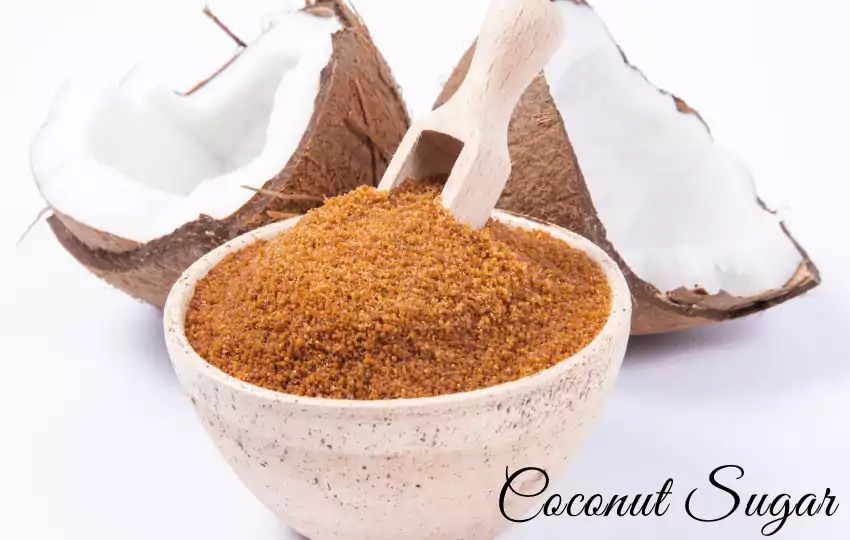Coconut sugar is a popular ingredient in many recipes, but other sweeteners can be substituted. In this blog post, we’ll explore some of the alternatives to coconut sugar and how they may affect your recipe.
We will also look at the benefits of using these substitutes and what you should keep in mind when making substitutions, so your final product turns out just right!
You don’t have to give up on yummy coconut recipes if you substitute with one of our suggested ingredients. Let’s get started!
What is coconut sugar?
Coconut sugar is a type of sugar that is made from the sap of coconut flowers.
The sap is boiled down to form a syrup, then dried and ground into a powder.
Coconut sugar tastes like brown sugar, but it includes more minerals than ordinary sugar.
It also has a lower glycemic index than sugar; thus, it does not increase blood glucose levels.
This is different than coconut palm sugar, which is also made from the sap of the flower but has a higher glycemic index than table sugar.
Coconut sugar does contain some antioxidants and minerals like zinc, calcium, iron, and potassium.
However, it also holds a lot of sugar, so you should only consume it in moderation.
Coconut sugar has a G.I of 35, which is lower than the glycemic index of regular sugar (68). This means that coconut sugar does not cause your blood glucose levels to spike as much as regular sugar does.
Coconut sugar is a suitable alternative to regular sugar for people trying to lower their blood glucose levels.
16 Absolute Substitutes For Coconut Sugar
1. MAPLE SYRUP- A healthy Alternative
Maple syrup is a healthier alternative to coconut sugar as a natural sweetener. It contains antioxidants and minerals such as zinc and manganese.

Maple syrup also has a lower glycemic index than coconut sugar, which does not trigger blood glucose to jump like other sweeteners.
For these reasons, maple syrup is a better choice for people with diabetes or trying to lose weight.
Maple syrup can be used in a variety of sweet and savory recipes. It is great for adding sweetness to oatmeal, pancakes, waffles, and yogurt.
Note- 1/4 Maple syrup=1 cup coconut sugar
Maple syrup can also be used in baked goods, sauces, and marinades. With its delicious flavor and benefits, maple syrup makes a great addition to any diet.
So if you are looking for a healthier, more natural sweetener, try maple syrup. You will love the taste and benefits it provides!
2. LIGHT BROWN SUGAR
Light brown sugar is a great alternative to coconut sugar. It has a similar flavor and can be used in the same way.
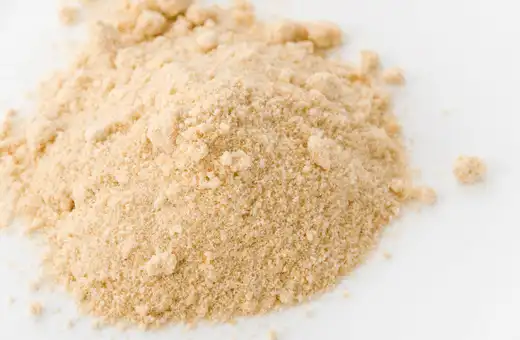
One cup of light brown sugar contains about 7 grams of protein, while one cup of coconut sugar contains only 2 grams of protein. This means that light brown sugar is a more filling option.
It also has fewer calories than coconut sugar, with 192 per cup compared to 242 per cup. Remember that light brown sugar is high in carbohydrates, with 48 grams per cup.
So if you are looking for a low-carbohydrate option, coconut sugar may be a better choice. Overall, light brown sugar is a good alternative to coconut sugar and can be used in most recipes.
Light brown sugar can be found at most grocery stores. You can also make your own by combining one cup of white sugar, half a cup of molasses, and a quarter of a cup of water in a saucepan.
Light brown sugar is shelf-stable and will last about six months to a year if stored properly.
3. SUCANAT
Sucanat is an unrefined sweetener from sugar cane that has been boiled and dried, removing most of the molasses.
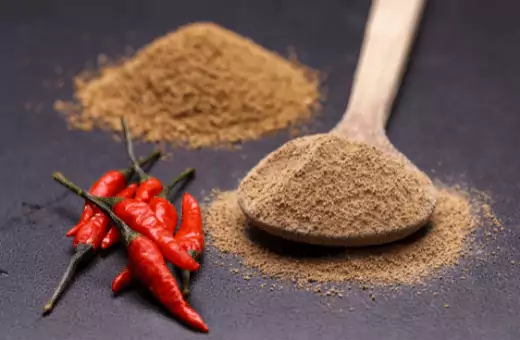
It is a healthier alternative to refined sugars like white sugar because it retains its minerals and has a lower glycemic index (it does not affect blood glucose levels as quickly) than other sweeteners.
Sucanat is available in most health food stores. It can be used as a 1:1 replacement for Coconut sugar in recipes.
Sucanat has a glycemic index of 42, which is lower than coconut sugar (55) and honey (58). It also contains many minerals, including calcium, magnesium, potassium, and zinc.
4. MAPLE SUGAR
Coconut sugar is a popular sweetener for baking or even making tea, but it’s also quite expensive. Maple sugar is suitable as an alternative to coconut sugar.
5. DATE SUGAR
Date sugar is the refined sugar of dried dates. Dried date sugar can be dissolved in water and has about the same sweetening power as white sugar (sucrose).
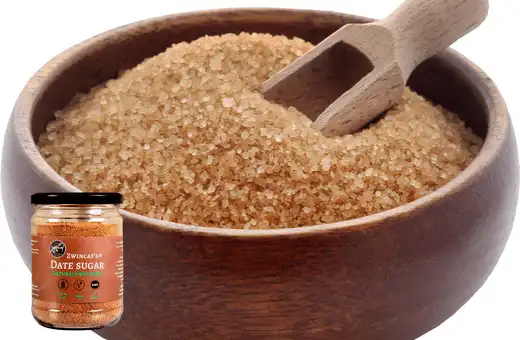
Date sugar can be a healthier alternative to coconut sugar. It is made from the sap of the coconut palm tree. Date sugar is produced from dried, ground dates. Both sugars are natural sweeteners, but date sugar has a few advantages over coconut sugar.
Date sugar can be used as a 1:1 substitute for other sweeteners like coconut sugar, honey, or maple syrup.
Date sugar has a caramel-like flavor with baked goods and hot cereals. It can also be used in smoothies and yogurt bowls. Date sugar is available at most health food stores.
6. PILONCILLO
Piloncillo is unprocessed cane sugar produced in Mexico and other Latin American countries. Piloncillo is sold in cones or blocks and has a slightly different flavor than coconut sugar.
Note- Use Piloncillo 1:1 Ratio.
Piloncillo is considered healthier alternatives to Coconut Sugar. It has a lower G.I, which doesn’t cause a big spike in blood sugar levels.
7. PALM SUGAR
Palm Sugar comes from the sap of cut flower buds or young fruit stalks of palm trees.
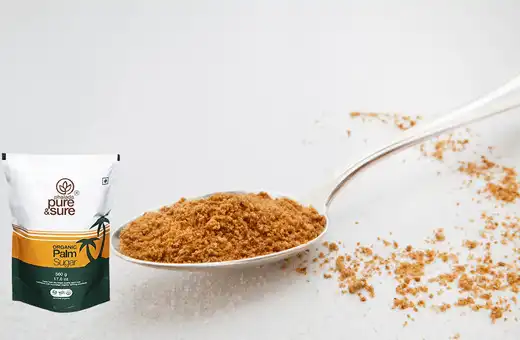
Palm Sugar natural product is collected in Indonesia, Malaysia, The Philippines, and other South Asian countries by tapping, just like tapping maple trees for syrup.
Palm Sugar comes in a soft solid form that melts when it touches your tongue but does not dissolve completely, unlike regular white sugar, which dissolves immediately in contact with water.
There are three main types of this sugar, namely dark brown Malacca Palmyra Palm Sugar (gula Melaka), light tan colored East Coast Coconut Palm Sugar (gula Jawa), and pale yellow West Coast Coconut Palm Sugar( gula Merah).
All palm sugars are somewhat moist, so they are stored in airtight jars in a cool, dry place.
8. RAW HONEY
Raw honey is a natural sweetener with a very pleasant taste and can be used as an alternative to sugar.
Raw honey is a substitute for coconut sugar, which is refined and processed. Compared to raw honey, it offers no advantage over table sugars’ high glycemic index or low nutritional quality.
To offer an easy substitution chart of how much Raw Honey you should use instead of coconut sugar.
9. STEVIA
Stevia is a sugar substitute that has the amazing ability to sweeten without spiking blood sugars like other natural or artificial sweeteners.
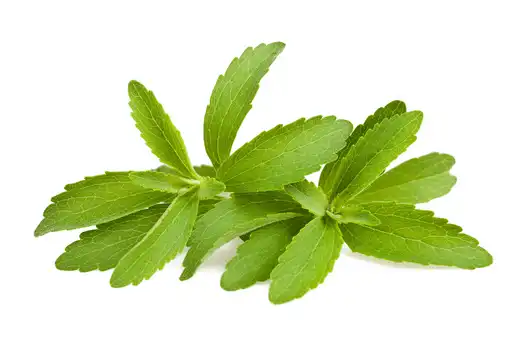
I personally use stevia in my recipes because I want to raise healthy children who don’t develop food addictions, sensitivities, and intolerances to certain foods.
That’s why I find stevia so perfect for all of my baking! It also provides an alternative to coconut sugar.
So what exactly is stevia? Stevia is an herb (called ‘stevia rebaudiana’) from South America. Its leaves have been used as a sweetener by locals for years.
Today, these can be found in most grocery stores as either cut leaves or as a greenish powder.
The taste of stevia is unique, and it takes a little getting used to it if you are not used to it.
10. AGAVE NECTAR
Agave comes from a cactus-like plant that mainly grows in Mexico and Central America. It can be used just like honey or maple syrup to sweeten food or beverages such as tea or coffee.
11. TURBINADO SUGAR
If you’re searching for a nutritious alternative to Coconut sugar, turbinado sugar is a great choice. It is a minimally processed sugar made from cane juice with a natural flavor and caramel-like sweetness.
Here are some ideas for using turbinado sugar:
· – Use it in place of regular sugar in recipes.
· – Add it to your morning coffee or tea.
· – Use it as a sweetener for baking or cooking.
· – Mix it with cinnamon or other spices for a unique flavor profile.
Turbinado sugar is a great way to add a touch of sweetness to your food without adding empty calories. It is also a reliable source of minerals like magnesium, potassium, and zinc.
12. GRANULATED SUGAR
For every 1 cup of coconut sugar, use 1 1/2 cups granulated sugar.
-If a recipe calls for melted coconut sugar, replace it with an equal amount of melted butter or oil.
-If a recipe calls for creaming coconut sugar with butter, replace the butter with an equal amount of vegetable shortening or margarine.
-When baking cakes or cookies, reduce the oven temperature by 25 degrees Fahrenheit when using granulated sugar instead of coconut sugar.
-If a recipe calls for caramelized coconut sugar, you will not get the same flavor from granulated sugar, but it can be omitted or reduced to compensate for its lack of sweetness.
13. DEMERARA SUGAR
If you’re searching for a real substitute for coconut sugar, demerara sugar is an excellent choice. Demerara sugar is made from pure cane sugar and has a rich flavor that pairs well with many foods.
Here are some tips for using demerara sugar as a coconut sugar substitute:
– Use demerara sugar in recipes that call for brown sugar. The flavor of demerara sugar is very similar to brown sugar, so it will be a good substitute in most recipes.
– Add demerara sugar to your coffee or tea. This sweetener pairs well with hot drinks and adds a delicious richness to them.
– Use demerara sugar as a topping for oatmeal or yogurt. This will help enhance the flavor of these dishes and add a subtle sweetness simultaneously.
– Use demerara sugar as a substitute for coconut sugar in desserts. Demerara sugar has a rich caramel flavor that will work well with many sweet treats, such as cookies or brownies. Also used in top pies, cakes, or other baked goods that call for coconut sugar.
14. TAGATOSE
Tagatose can be used in place of coconut sugar in most recipes. It has a similar taste and texture, so you won’t need to make any adjustments when baking or cooking.
However, it is important to note that tagatose is not as sweet as coconut sugar, so you may need to use it a bit more if you use sweeteners with a high glycemic index.
15. MONK FRUIT SWEET
Monk fruit is a natural sweetener extracted from the Luo Han Guo fruit. It is low calorie, low glycemic, and has a sweet taste similar to cane sugar but with no aftertaste.
Here are some ideas for using monk fruit sweet as an alternative to other sweeteners:
1) Use monk fruit in place of honey in tea or coffee. Monk fruit is a fantastic way to add sweetness without increasing your drink’s calorie or glycemic load.
2) Use monk fruit in place of sugar in baking. Monk fruit is a great way to reduce the amount of sugar in your recipes while still maintaining the sweetness and flavor.
3) Use monk fruit as a sweetener for smoothies or yogurt. Adding a little monk fruit to your smoothie or yogurt can give it a delicious, sweet flavor without adding any extra calories.
4) Use monk fruit to make sweetened condensed milk. Monk fruit-sweetened condensed milk is a great way to add sweetness to your recipes with very few added calories.
5) Add monk fruit extract to water or seltzer for a healthy, refreshing drink. Monk fruit extract has a sweet taste and no aftertaste, making it the perfect addition to water or seltzer.
16. JAGGERY
Jaggery is obtained from the sap of palm trees. The sap is boiled down to a thick syrup, which is then poured into molds and allowed to cool.
Jaggery has diverse flavors based on the palm tree from which it is produced.
It has a chewy feel and can be hard or soft. Jaggery is high in minerals such as iron, magnesium, and potassium and vitamins B1, B2, and B3.
It also contains antioxidants, which aid in disease prevention. Jaggery has a sweet taste that is similar to molasses.
It can be utilized in place of sugar in recipes.
Read More– How do you bae without sugar instead of Dates (11 Alternatives)
Palm Sugar VS Coconut Sugar
There are many types of sugar on the market, but two of the most popular are palm sugar and coconut sugar.
They each have pros and cons; take a look at them individually:
The sap of the Palmyra palm tree is used to make palm sugar. The sap of the coconut bloom is used to make coconut sugar.
Palm sugar is made from the sap of various palm trees such as coconut, date, pandan, etc. On the other hand, Coconut sugar is made from nectar or flower bud from a coconut palm tree.
You can easily identify them because palm sugar will be in solid form with deeper golden brown color, while coconut sugar will be in powdery texture and light brown color.
Both of these sugars contain a rich amount of potassium and other essential vitamins.
Wind Up Coconut Sugar Substitute
I hope my list of Coconut sugar replacement help you. Choose according to your recipe, sweetness.
All substitutes are healthy and easily finable.
FAQs Related to Coconut Sugar & Its Alternatives
Q1. How much maple syrup do I substitute for coconut sugar?
1:1 is the general rule of thumb. If a recipe calls for 1/2 cup of coconut sugar, you can replace it with 1/2 cup of maple syrup.
However, it’s always best to taste as you go and make small adjustments if needed.
Some recipes may need more or less maple syrup, depending on the overall sweetness of the dish.
Q2. Does coconut sugar taste different?
Coconut sugar taste is like brown sugar, with a slight caramel flavor. However, it may differ from one brand to the next.

